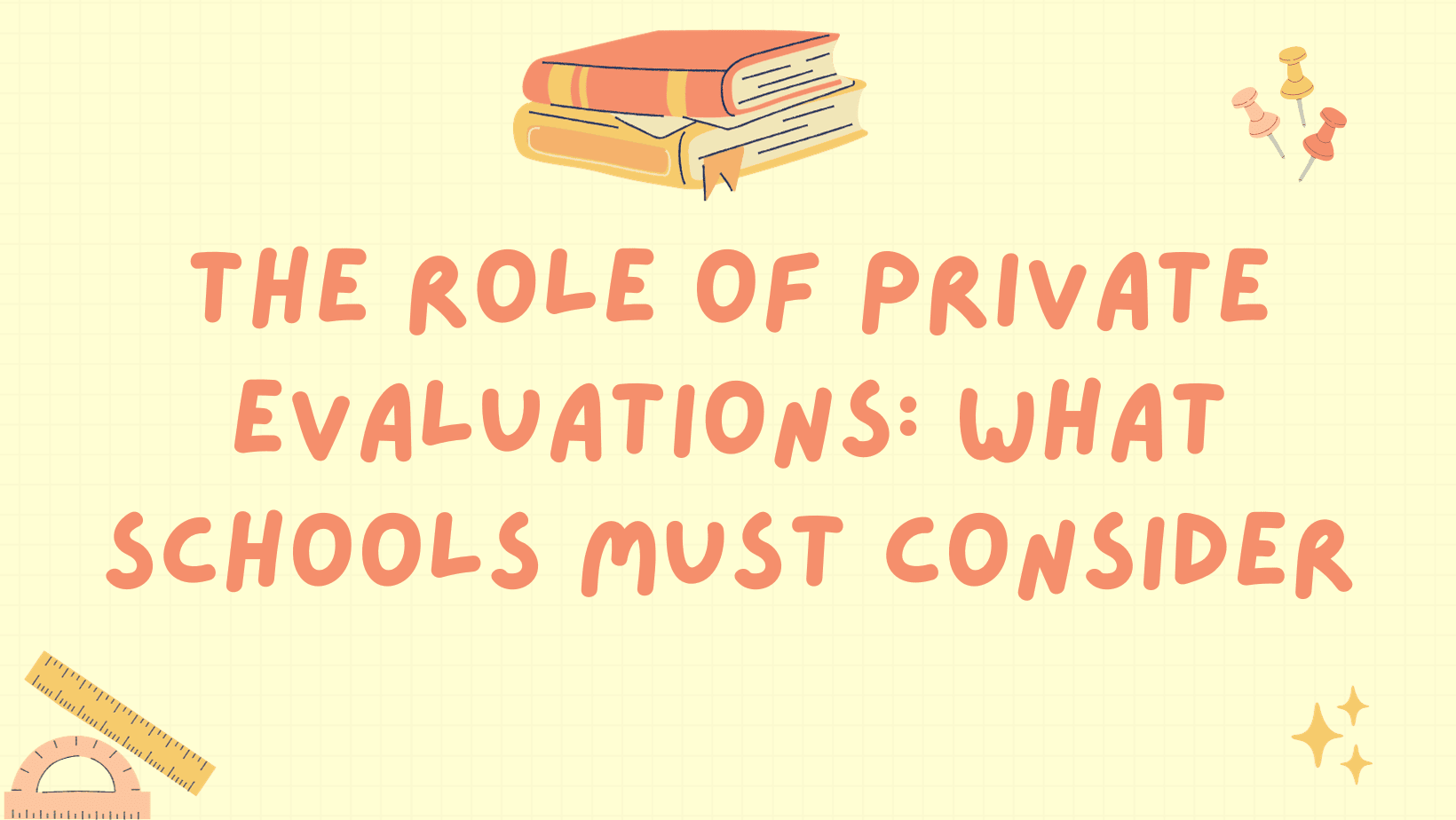When it comes to updating IEPs, the inclusion of private evaluations can be a contentious issue. By private evaluations, we are talking about evaluations done outside of school that parents arrange and parents or insurance companies pay for. Do schools have to consider a private evaluation when updating an IEP? If they accept the report, which parts of the IEP should be updated, and must they accept the recommendations of the private assessor?
Private Evaluations and the IEP Process:
- Why Private Evaluations: In many cases, parents or guardians choose to seek private evaluations for their child to gain a more comprehensive understanding of their psychological, educational, attentional, or social emotional needs. These evaluations can include assessments, observations, and recommendations from independent specialists, such as psychologists, speech therapists, or occupational therapists.
- Under the Individuals with Disabilities Education Act (IDEA), schools are required to consider private evaluations when developing or updating an IEP.
- Accepting the Evaluation Report: While schools are not obligated to automatically adopt the findings of private evaluations, they are required to consider them as part of the IEP team’s discussions and should discuss them at a formal IEP meeting.
- Updating Present Levels: If the private evaluation uncovers new information or reveals discrepancies with the school’s evaluations, the present levels of performance in the IEP may need to be updated. The IEP should accurately reflect the student’s current educational needs and abilities. New and accurate information from qualified assessors should be included in the IEP.
- Incorporating Recommendations: The IEP team should carefully evaluate and discuss with parents the recommendations made in the private evaluation. Parents may bring the private evaluator to the IEP review of the assessment. While not all recommendations are required to be included in the IEP, they should be considered, and a rationale provided if there is a service or support the parent believes their child needs that the IEP team refuses to include in the IEP. This rationale should be included in the “Prior Written Notice” from the meeting.
- Test Scores & Recommendations: Remember that test scores are only one part of the evaluation. The recommendations often provide valuable insights into strategies, interventions, and accommodations that can benefit the student’s education. These recommendations are one of the biggest benefits to private evaluations. One way parents can help the IEP team frame their thinking about the suggestions in the report is to remind them that these assessments are supplementary information that the parents are providing to the school team, with the intention of helping the IEP team better understand their child.
In the process of updating an Individualized Education Program, schools must consider private evaluations. While they are not obligated to accept all recommendations, they are required to formally review the evaluation report, update present levels of performance as needed, and give serious consideration to the recommendations. Schools must document the reason for denial of accommodations and services that they refuse to provide. Private evaluations are critical in parents having unbiased, thorough assessments of their children and a good IEP team will be open to fairly considering them.
Advice for Parents– Why Investing in a Private Assessment for Special Education is Worthwhile
In the realm of special education, the journey of finding the right support for a child can be both challenging and… expensive! One significant decision that parents often contemplate is whether to invest in a private assessment for their child’s cognitive, educational, and social emotional needs.
Each child is unique, and their needs vary significantly. Whether it’s a learning disability, Autism Spectrum Disorder, anxiety, or other challenges. Being able to truly identify all of a child’s individual traits, strengths, weaknesses, and needs (including recommendations going forward) requires a highly skilled evaluator or team of evaluators who are The willing and able to make recommendations. For this reason, we typically recommend private evaluations where possible. This is not to say that school system evaluations aren’t worthwhile– they can be an excellent source of information. However, some school system evaluations may provide test scores but not a significant amount of analysis of their meaning or highly specific recommendations for what the individual child needs. Other school systems may not have evaluators who are specialized enough in a child’s particular profile.
- Comprehensive Insights: Private assessments can involve a range of evaluations, such as cognitive, academic, and behavioral assessments. This comprehensive approach helps identify underlying issues that might not surface in a more standard evaluation.
- Individualized Roadmap: A private assessment provides a roadmap to move forward tailored to your child’s needs. It offers specific recommendations for interventions, accommodations, and strategies that can make a difference in your child’s educational journey.
- Early Intervention: Detecting and addressing challenges early can significantly impact a child’s progress. A private assessment can uncover issues that may have gone unnoticed at school, or may be necessary with young children who the school system does not agree to evaluate, enabling timely interventions.
- Investment Considerations: While private assessments entail a cost, the investment often yields significant long-term benefits. While few, there are some organizations and providers who take insurance.
In the words of Helen Keller, “The only thing worse than being blind is having sight but no vision.” Embrace the vision of a brighter future for your child by doing your research, engaging your own outside “team,” and bringing all the information you can to the IEP table.
This blog post is for informational purposes only. It is not legal advice and does not create an attorney-client relationship.
